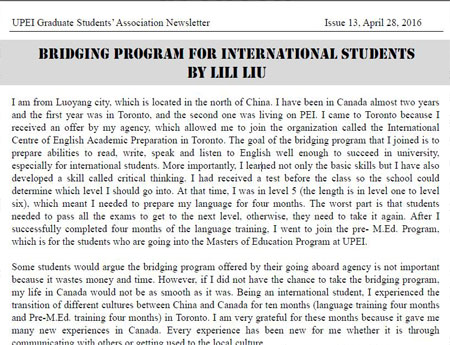
我来自中国的北方城市洛阳。我在在加拿大已经近两年的时间了,第一年我在多伦多,第二年在爱德华王子岛省。我在多伦多是因为我从代理处收到了ICEAP的录取通知书,我加入的桥梁课程的目标是提高英语听、说、读、写能力,为在大学取得成功做好准备,尤其是对国际留学生。更重要的是,我不仅学习了基本技能,而且还学会了运用批判性思维。上课之前我做了一个水平测序,以确定我应该进入的级别。当时,我在5级(在1级-6级中),这意味着我需要花四个月的时间学习英语。最糟糕的是,学生们需要通过所有的考试才能进入下一个级别,否则就需要重读。成功地完成了四个月的语言学习之后,我顺利进入教育学硕士预科课程,这是为学生进入爱德华王子岛大学(UPEI)教育学硕士课程所设的项目。
一些学生会认为他们所在机构提供的桥梁课程并不重要,因为浪费时间和钱。但是,如果我没有参加桥梁课程,我在加拿大的生活也不会这样一帆风顺。作为一名国际留学生,我在多伦多经历了十个月的过渡期以适应中国和加拿大之间的不同文化(语言学习四个月和教育学硕士预科四个月)。我非常感谢这几个月的经历,因为它让我在加拿大有了许多新经验。这些经验或是通过与他人的交流,或是通过适应当地的文化,对我来说都是全新的。
刚到加拿大时,我发现现实与我从书本中所了解到的完全不同。我习惯了各种食物,并且能很谦逊地咨询出售食品的人。然而,我在学术领域有很长一段时间困难期。我无法适应加拿大的写作风格,因为老师不懂我在写什么。我还记得我不得不五次重写的文章,但是我的老师告诉我,她仍然很难从这篇文章中找到我的观点。之后,我甚至哭了,因为我想我写不出来加拿大老师想要的东西。我开始考虑加拿大和中国之间的差异。最后,我发现差距是在文章的结构,因为不同的文化背景有不同的逻辑。因此对作为国际留学生的我来说,在准备英文学术写作中,这是一个巨大的差异。
在桥梁课程的这十个月期间,我受益匪浅。首先,我在与老师和同学的互动中获得了很多经验。在桥梁课程中,通常有一个小规模的教室,有利于同伴的支持和与老师的互动。此外,桥梁课程的老师开发我的写作技能,教会我从加拿大网站上寻找资源和信息。在中国,我们基本上不能进入谷歌、Facebook或Twitter等。因此,选择网站寻找我的学术论文引用对于当时的我来说是非常困难的,因为我之前不会用英文研究英语网站。但是现在,我不仅知道如何使用,而且我还可以教其他国际留学生如何寻找他们的写作资源。此外,能与加拿大人自信的交流沟通也是我的一个重要的收获。因为我是一个有不同的文化背景新生,我不想与当地人交谈。我一直认为我的口语是班里最差的。然而,基于老师的鼓励和训练,我在加拿大人面前变得越来越自信,我甚为新生做了几次演讲,演讲的内容是在加拿大生活和学习的经验。因此,桥梁课程确实对学生在学术领域的的发展,甚至在精神方面都有很大的影响。
无论学生选择什么课程,在加拿大应该都是值得信赖的,因为国际留学生应该询问这个机构的详细信息,这样才能在学术之旅有一个有意义的开始。
Bridging Program for International Students
by Lili Liu
I am from Luoyang city, which is located in the north of China. I have been in Canada almost two years and the first year was in Toronto, and the second one was living on PEI. I came to Toronto because I received an offer by my agency, which allowed me to join the organization called the International Centre of English Academic Preparation in Toronto. The goal of the bridging program that I joined is to prepare abilities to read, write, speak and listen to English well enough to succeed in university, especially for international students. More importantly, I learned not only the basic skills but I have also developed a skill called critical thinking. I had received a test before the class so the school could determine which level I should go into. At that time, I was in level 5 (the length is in level one to level six), which meant I needed to prepare my language for four months. The worst part is that students needed to pass all the exams to get to the next level, otherwise, they need to take it again. After I successfully completed four months of the language training, I went to join the pre- M.Ed. Program, which is for the students who are going into the Masters of Education Program at UPEI.
Some students would argue the bridging program offered by their going aboard agency is not important because it wastes money and time. However, if I did not have the chance to take the bridging program, my life in Canada would not be as smooth as it was. Being an international student, I experienced the transition of different cultures between China and Canada for ten months (language training four months and Pre-M.Ed. training four months) in Toronto. I am very grateful for these months because it gave me many new experiences in Canada. Every experience has been new for me whether it is through communicating with others or getting used to the local culture.
When I arrived in Canada, everything was different from what I learned from the textbook and what I actually felt in the real Canada. I did get used to the varieties of food and became modest enough to consult the people who sell the food. However, I had suffered in the academic field for a long time. I could not fit in a Canadian writing style because the instructor could not understand what I wrote. I still remember I had to rewrite my essay five times, but still my instructor told me that she still found it hard to get my point from the essay. After that, I almost started crying because I thought I could not write what the Canadian instructor wanted. I started to think about what the differences were between the Canadian and Chinese writing. Finally, I found the gap was in the structure of the essay because of the diverse logic in differing cultural contexts. Therefore, this was a big gap in preparedness for academic writing in English for me as an international student.
During the training of the bridging course, there were many benefits that I attained over 10 months. First of all, I had a great experience in interacting with my instructors and classmates. In the transitional program, it usually has a small-scale setting of classroom, which is good for peer-supporting and interaction with teachers. Moreover, the instructor in a bridging course developed my writing skill for finding resources and information in Canadian websites. Basically, in China, we do not have access to get into Google, Facebook, or Twitter etc. Thus, choosing the website to find references for my academic paper was very hard for me at that time because I would never use English to research the English websites. But now, I not only know how I can use that, I can teach other international students how to find the resources for their writing. Furthermore, gaining confidence for my communication skill with Canadians is an essential benefit I got. Because I was a new student with a different cultural background here, I did not want to talk with the locals. I always believed my speaking skill was the worst in my classroom. However, based on the encouraging inspiration and training from my instructor, I became increasingly confident in front of Canadians, and I even had several public speeches for the new students, which talked about the experience both for living and studying in Canada. Therefore, taking a bridging program does have a great influence on the academic performance of students’ development in the academic area, and even in mental aspect.
No matter what program the students choose it will be, it should be trustworthy in Canada because international students should ask for the detailed information about the organization in order to have a meaningful beginning in an academic journal.